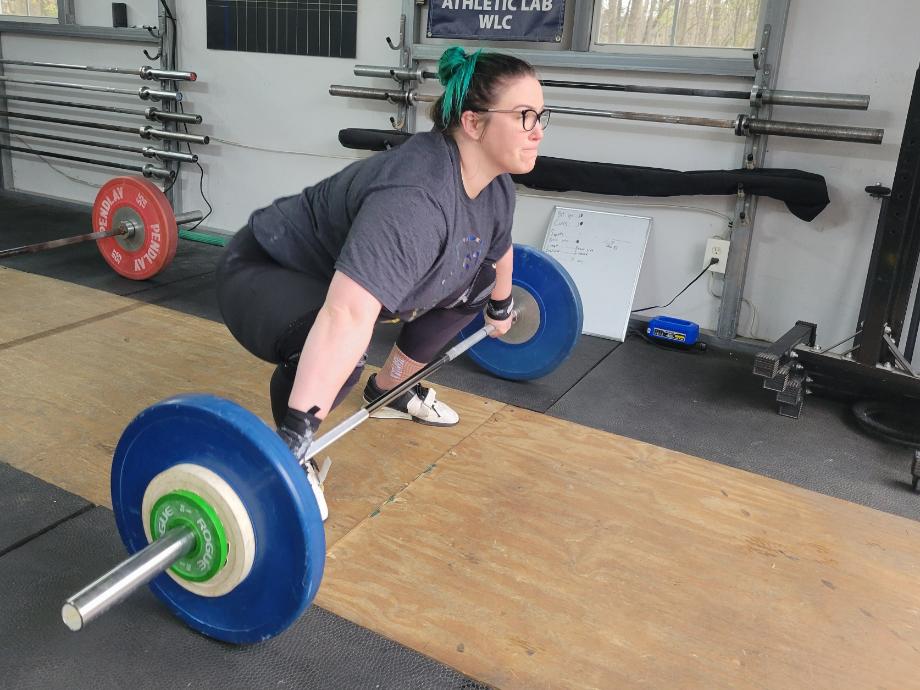We test and review fitness products based on an independent, multi-point methodology. If you use our links to purchase something, we may earn a commission. Read our disclosures.
Since I started competing in the sport in 2000, one brand of Olympic weightlifting equipment that has always had a recognizable name and high reputation (which may have been slightly tarnished with the release of their Heavy Mug) is Eleiko Sport.
Starting from waffle irons and moving on to Olympic barbells and other fitness equipment, the company is historically known for high-quality products—and a premium price. Having competed on Eleiko barbells and bumper plates over the years, I can attest that the bars are some of the best in the sport. Still, does the high price match the high quality?
We’ve had several people on our team and expert panel try out and experience Eleiko’s Olympic weightlifting training barbell. In this Eleiko IWF Weightlifting Training Bar review, I’ll cover our experiences with this barbell—both the 15-kilogram and 20-kilogram versions—and see who may want to add this premium barbell to their garage gym.
Dozens of Barbells Lifted, Tested, and Dropped
When it comes to barbells, the GGR team has tons of experience with them all: Olympic barbells, curl bars, safety squat bars, and trap bars to name a few. We’ve had our hands on dozens of barbells—closing in on 100 barbells tested and reviewed. We know what features to look for in a barbell, and how that should impact the price and value of a bar.
Additionally, our team of certified personal trainers, lifting coaches, and competitive athletes comes with a level of expertise unparalleled in the industry. For the Eleiko IWF Weightlifting Training Bar, we’ve had quite a few Olympic weightlifters test out the bar, including myself, an Olympian. Along with the overall value and customer experience, we looked at features of the barbell, such as:
- Tensile strength
- Coating and finish
- Durability
- Versatility
- Knurling and grip
- Barbell spin
Eleiko IWF Weightlifting Training Bar
Eleiko IWF Weightlifting Training Bar, NxG 20KG Men
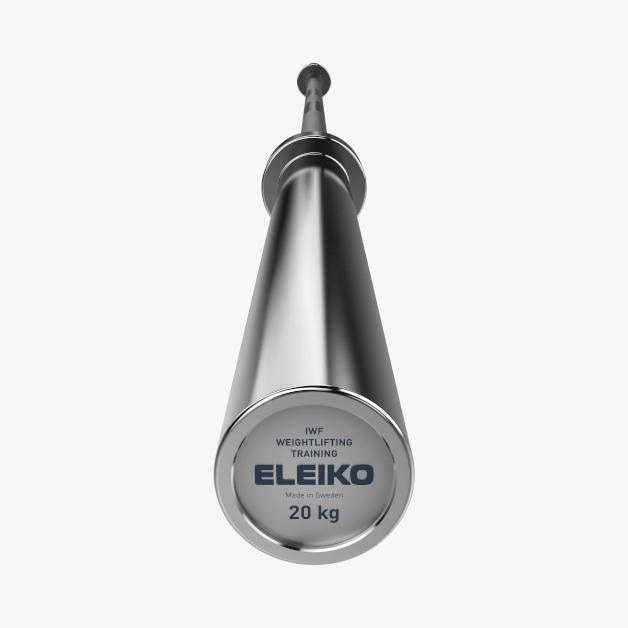
Product Highlights
- 8 precision needle bearings
- Dust-proof seal on sleeves
- IWF-certified
- 12-year warranty
- Comes in 20kg and 15kg options
Pros & Cons
Pros
- IWF certified
- Great spin
- Needle bearings
- 12-year warranty
- Comes in 20kg and 15kg options
Cons
- Costs more than $1,000
- Sharp knurling
- 20kg version has center knurling
Bottom Line
If you have the money, this Eleiko bar is fantastic for those who perform weightlifting movements, specifically, the clean-and-jerk and the snatch.
A Quick Look at the Eleiko IWF Weightlifting Training Bar
It’s wild to think, but early on in the sport of Olympic weightlifting, barbells weren’t made durable enough to withstand an entire competition, often bending or breaking over the span of a world championship.
Originally a company in Sweden producing waffle irons, Eleiko had a couple of employees who wanted to build a better and more durable barbell. With specialized hardened steel and a waffle-pattern knurling, Eleiko created the first weightlifting barbell to last an entire competition at the 1963 World Weightlifting Championships. Since then, Eleiko has become a common name in weightlifting, powerlifting, and fitness in general.
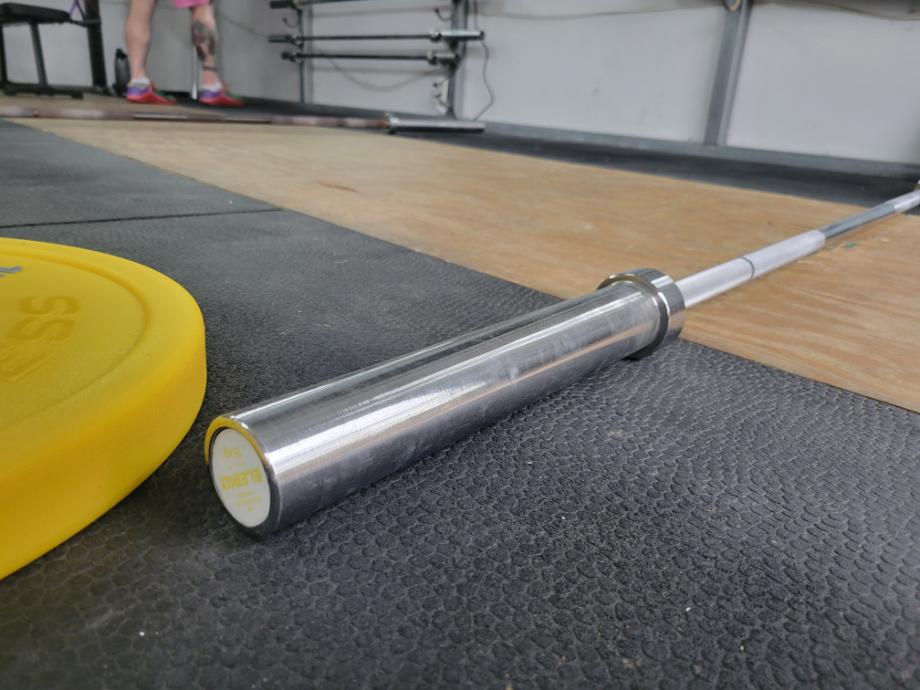
Although Eleiko creates fitness equipment to outfit both commercial and home gyms—cable machines, racks and rigs, and home gym flooring—their specialty is barbells. They have four barbells made for Olympic lifters:
- Eleiko IWF Weightlifting Competition Bar
- Eleiko IWF Weightlifting Training Bar
- Eleiko Performance Weightlifting Bar
- Eleiko Weightlifting Technique Bar
Each barbell comes in either 20- or 15-kilogram versions, except the technique bar which is either 10 or 5 kilograms. Along with Olympic weightlifting bars, Eleiko makes powerlifting bars and hybrid bars, including the Eleiko XF bar, which is geared toward CrossFit.
Before You Buy
- The competition bar and training bar are both IWF-certified, meaning they are built within the specifications for Olympic weightlifting competition. The only real difference between the two bars is the aggressiveness of the knurling—and the price.
- While I’m typically not too upset about a 12-year warranty for a barbell, Eleiko has such a reputation on their barbells that I’m surprised they don’t offer a lifetime warranty. As such, these bars are made to be durable and will last for years to come.
- Every bar comes with a magnetic brush that you can attach to a rack for easy storage. Use this brush with plastic bristles to preserve the bar’s chrome coating best. People will make the mistake of brushing the bar with metal bristles, which will destroy this bar’s finish.
Eleiko IWF Weightlifting Training Bar Video Review

Is the Eleiko IWF Weightlifting Training Bar Worth It?
When people speak about Eleiko bars in the Olympic lifting community, it’s hard to compare the Eleiko feeling to other barbells. “Eleiko is simply in a class of its own,” says GGR Senior Director of Content Kate Meier, NASM-CPT, USAW-L1, CF-L1. “Just the bar’s spin is so much better than the spin on Rogue training bars.”
RELATED: Rogue Fitness Barbell Reviews
Eleiko’s Olympic bars are truly high performance, with proprietary Swedish steel and chrome coating and durability that isn’t often seen in other barbells, with a tensile strength of 215,000 pounds per square inch. Unfortunately, with that high quality comes a high price tag, at $980 for both the 15- and 20-kilogram training bars—before shipping costs.
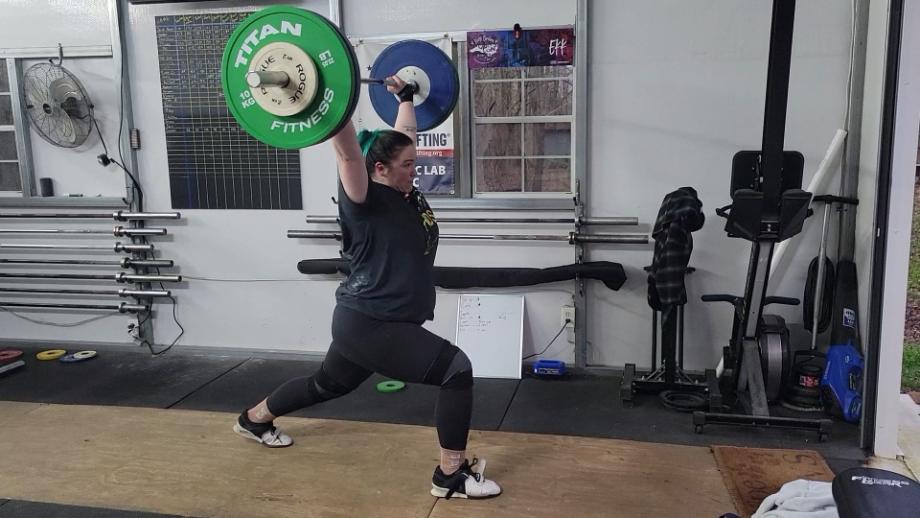
Compared to other higher-end Olympic lifting barbells, Eleiko is definitely pricey. The Uesaka Training Bar, probably most comparable to the Eleiko Training Bar, costs $885. Rogue’s top offer for Olympic lifters is the Pyrros Bar, and it’s $720 with a stainless steel finish (the 15-kilogram version is even less expensive). The REP Fitness Alpine Bar comes in a stainless steel finish at $450 and free shipping.
That said, Eleiko is just on another level. With a controlled spin, great bar whip, and grippy knurling, this is the kind of barbell any Olympic weightlifter would want. The price may not entice everyone to make the purchase, but for anyone wanting high-quality construction and best-of-the-best performance in their Olympic weightlifting bar, this is worth the higher price point.
Great for:
- Lifters wanting a premium Olympic barbell
- Olympic weightlifters wanting an IWF-certified training bar
- Those wanting a bar with great spin and long-lasting durability
Not recommended for:
- Strength athletes who prefer a powerlifting bar
- Those wanting a multipurpose barbell with dual markings
- Anyone looking for budget home gym equipment
Eleiko IWF Weightlifting Training Bar Specs
| Price | $980 |
| Bar weight | 20 or 15 kg |
| Shaft diameter | 28 mm |
| Loadable sleeve length | 415 mm (16.34 in) |
| Knurl | 1.2 mm, waffle pattern |
| Center knurl | Passive Olympic center knurl on the 20-kg bar |
| Knurl marks | IWF markings |
| Coating | Proprietary chrome finish |
| Tensile strength | 215,000 PSI |
| Bushing or bearings? | Needle bearings |
| Warranty | 12 years |
Experience With the Eleiko IWF Weightlifting Training Bar
We’ve had quite a few people on our team try out the Eleiko IWF Weightlifting Training Bar—including GGR founder Coop Mitchell. However, this review will primarily focus on the lifting experience of three weightlifters on our team—GGR Senior Director of Content Kate Meier, NASM-CPT, USAW-L1, CF-L1; Jacob Penner, USAW-L2, weightlifting coach and gym owner; and me, an Olympian and internationally competitive weightlifter.
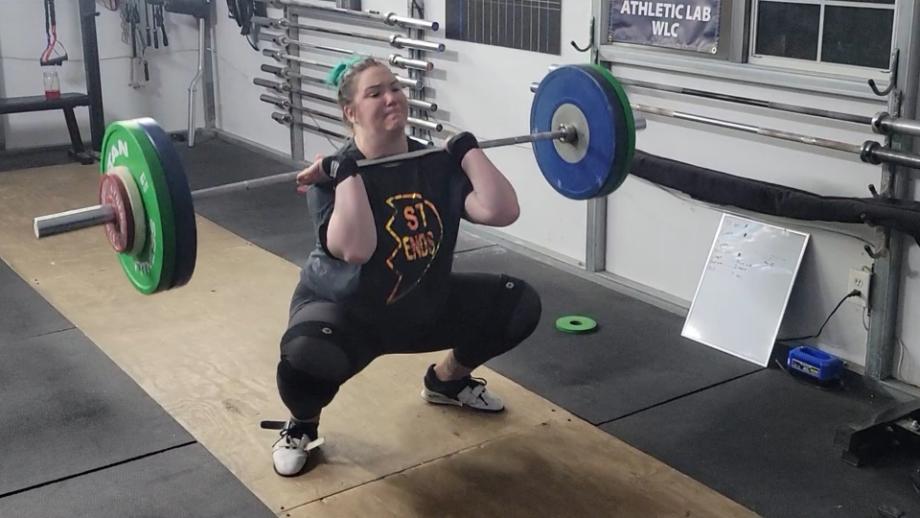
Kate has had and used the training bar at her gym for about four months now, but the three of us have used Eleiko barbells—both competition and training varieties—over the past decade or longer. We’ve loaded bumper plates on them for the snatch and clean and jerk, as well as squats, deadlifts, pulls, and more.
All three of us agree that this is the barbell for Olympic weightlifting. The spin, feel, and whip are all made to make the snatch exercise and clean and jerk feel natural and smooth. Jacob adds, “This is my all-time favorite bar, and I’ve lifted on weightlifting bars from just about every major brand. The spin is perfect for the Olympic lifts, but I use it for squats, too, because I like the whip and bounce the barbell gives. Not everyone likes the bar whip for squats, but I really do.”
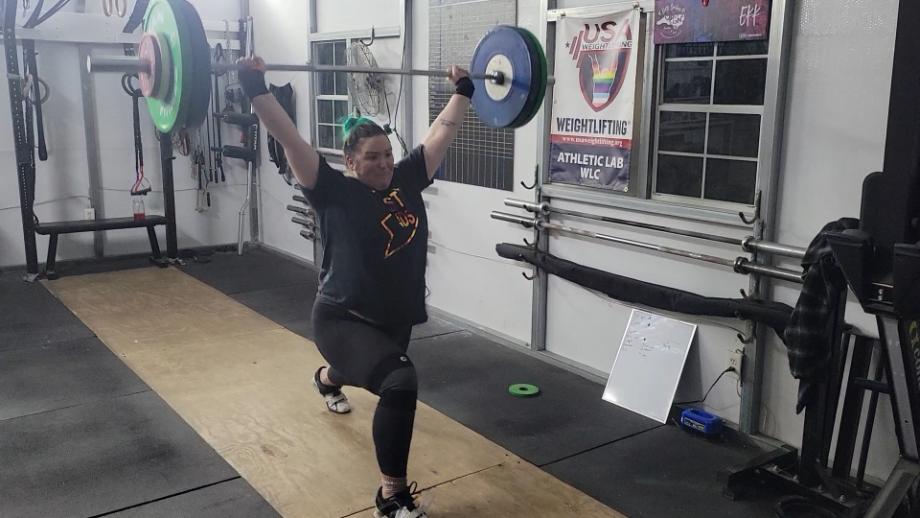
Construction
Eleiko takes great care in crafting their barbells, and it shows when you look at the finer specs of the barbell. Made from specially formulated Swedish steel, the barbell has great spin while the sleeves are constructed with tight tolerances. The sleeves also have a dust-proof seal, which helps keep the precision needle bearings within the barbell clean and moving smoothly.
Tensile Strength
Tensile strength is the best feature of a barbell to determine its durability, as well as the bar’s whip and flex during the snatches and clean and jerks. Measured in pounds per square inch, tensile strength is a measurement of the force required to permanently bend or break a barbell. A higher tensile strength means a more durable barbell.
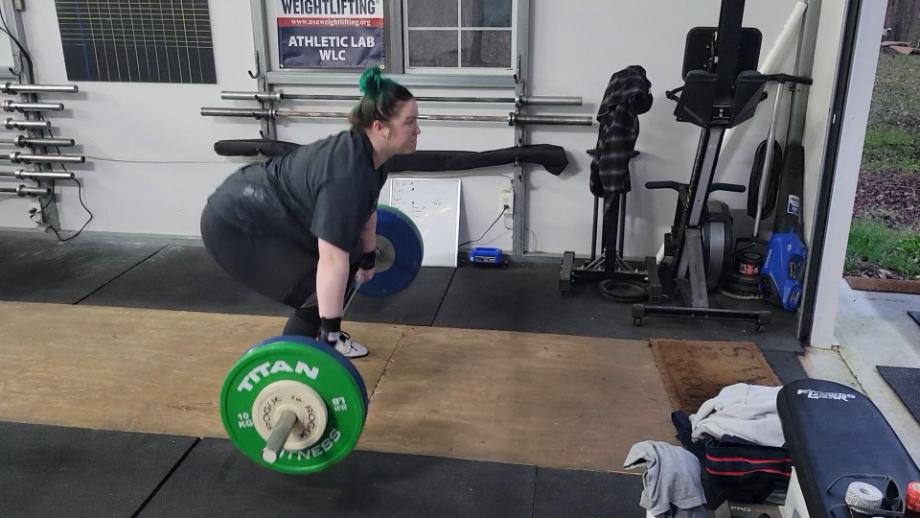
Most high-end barbells range between 190,000 and 205,000 PSI to balance between durability and good whip on the bar. The Eleiko training bar has a tensile strength of 215,000 PSI, however. Even better is that the bar still maintains excellent whip even with the higher tensile strength, earning it a 5 out of 5 here.
Spin
The sleeves’ rotation system of the Eleiko IWF Weightlifting Training Bar is made with needle bearings, which allows for solid spin, needed in Olympic lifting. Compared to bushings, the bearings provide a greater spin on the barbell. Most IPF or powerlifting barbells will use bushings to have less spin.
RELATED: Barbell Anatomy 101
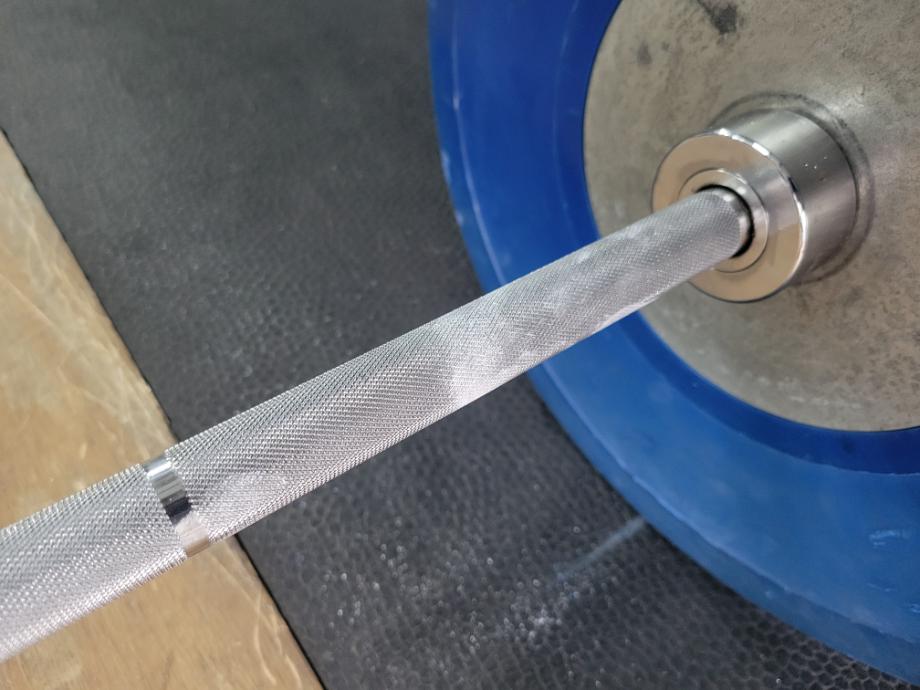
In 2017, Eleiko updated their needle bearing system to provide tighter tolerances and a more controlled spin. Instead of spinning almost uncontrollably, Eleiko bars simply spin enough to successfully move under a snatch or clean. “Some might say that the updated IWF bar now spins ‘slower,’ but I think it just doesn’t spin unnecessarily,” says Jacob. “I’ve used both iterations of the barbell, and I prefer the new spin.” He gives the spin a 5 out of 5.
Knurling
The knurling on the Eleiko training bar is somewhat aggressive, having a 1.2-millimeter deep knurl across the barbell. Still, this isn’t the most aggressive knurling on the market and has a nice grip without tearing up your hands. It’s definitely grippy enough for the snatch and clean and jerk, while also not being too aggressive for daily training.
RELATED: What Is Barbell Knurling?
“I love this knurling; it has the best grip I’ve ever used,” says Kate. “It holds chalk very well, and it gives you a great grip without cutting your hands every session.” I agree that the barbell has a great grip; still, I prefer a bit more aggressive knurl to my barbells. That said, the knurl on this will win a lot of people over, earning it a 4.5 out of 5.
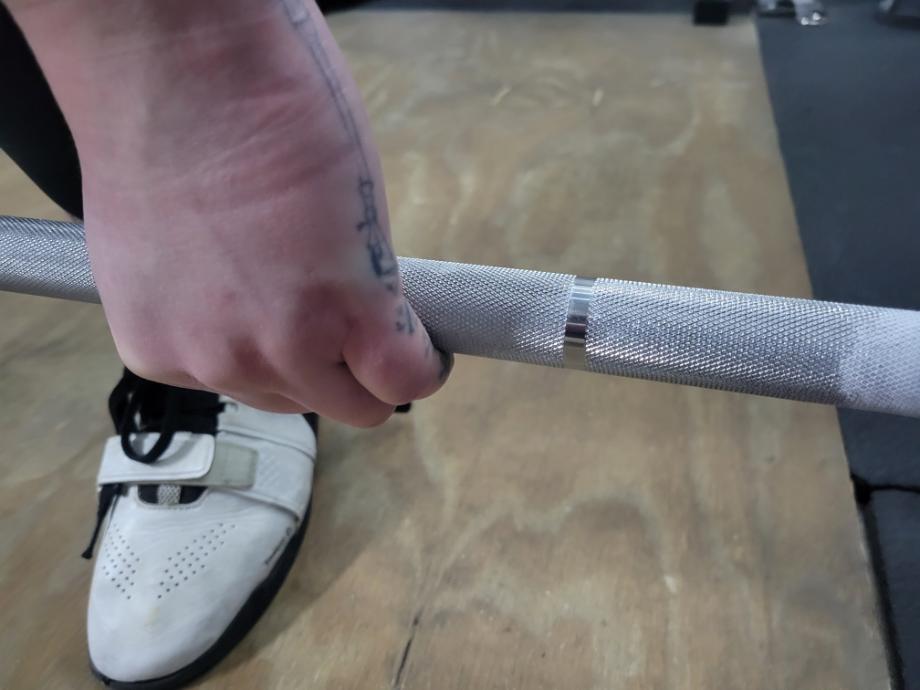
Coating
Chrome isn’t usually thought of as being the high-end finish for a premium barbell; most people will want stainless steel for their best bar. Some companies use a hard chrome finish for more corrosion resistance. Eleiko uses a proprietary chrome coating that looks beautiful and also holds up immensely well. We rate the finish a 4.5 out of 5.
Nevertheless, both Kate and Jacob warn to only use a plastic brush to scrub down your barbell. Using steel brushes will scrape the coating and destroy the finish. Jacob adds, “Very few Eleiko bars rust from my experience. The only time I see damage like that is when people use metal brushes to brush off chalk and clean the barbell. Don’t do that.”
Durability
Now that we’ve gone over the construction of the barbell, you might be able to tell that this barbell is built to last. With a high tensile strength and a solid finish, I’ve never seen an Eleiko barbell worn down to be unusable, even after years of use. With a little bit of care, these barbells can last a lifetime. It earns a 5 out of 5 for durability.
RELATED: How To Clean a Barbell
Versatility
Although the Eleiko IWF Weightlifting Training Bar is built for Olympic weightlifting, it can still be fairly versatile. It only has grip markings along the knurl for weightlifting, so if you want powerlifting knurls, you might want a true multi-purpose barbell. Still, with a high tensile strength, and smooth spin, this can be used for a variety of movements and exercises outside of weightlifting.
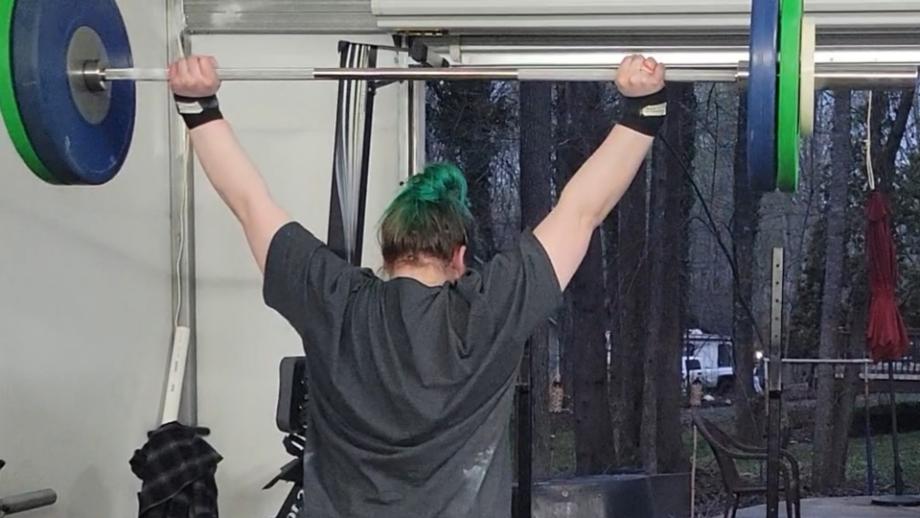
Jacob himself uses it for squats, and prefers it for squats. Kate, on the other hand, doesn’t squat with it, not because the bar isn’t suited for it, but because she doesn’t want to wear the knurling down by putting it in a squat rack. “I’m a snob who doesn’t want to ruin her bar by putting it in the rack,” she jokes. Can it be used for high-intensity training and powerlifting? Yes, absolutely. Still, you may not want to use this $1,000 barbell for any and everything.
Eleiko IWF Weightlifting Training Bar vs Eleiko IWF Weightlifting Competition Bar
Eleiko IWF Weightlifting Competition Bar
Eleiko IWF Weightlifting Competition Bar, NxG 20kg Men
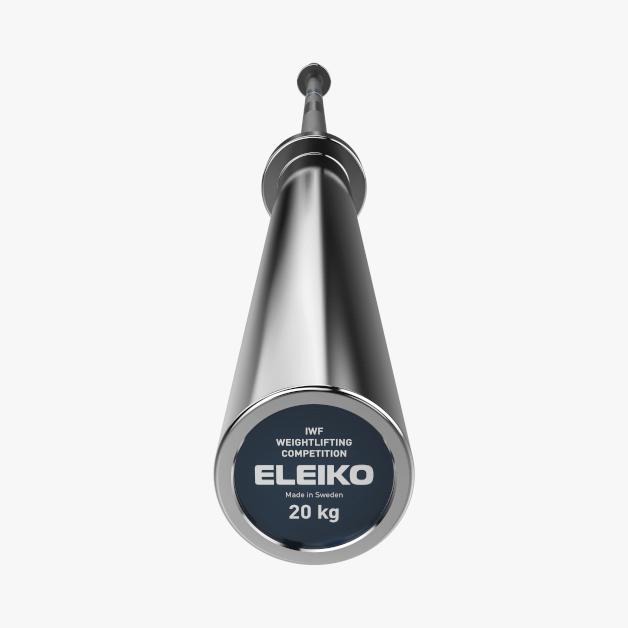
Product Highlights
This is the bar competitive athletes dream about. Our IWF certified competition bar has the distinct honor of being used to set 1,000+ world records over the years.
Pros & Cons
Bottom Line
My wife, Emelie Wilkes, who has competed in Olympic weightlifting herself for the past decade, has trained on the Eleiko IWF Weightlifting Competition Bar for the majority of her athletic career. She loves it, citing a lot of the same perks as the training barbell—a great spin, good grip, and nice whip, to name a few.
Looking at the specs of the two Eleiko bars, they’re nearly identical, with two major differences: the knurling and the price. The knurling is a bit more aggressive, with the same 1.2-millimeter knurl, but a sharper, more pronounced competition knurling. The price comes from the higher level of calibration needed to be IWF-certified for competition, which is just a little higher than what is needed for training bars to be certified.
For most people, if you’re wondering between the training or competition bar, the training bar provides a little more value and has a knurling that will keep your hands from ripping excessively. If you prefer more aggressive knurling, then the competition bar might be worth a look, but the nearly $200 price jump won’t make it worth the cost for most.
| Eleiko IWF Weightlifting Training Bar | Eleiko IWF Weightlifting Competition Bar | |
| Price | $980 | $1,150 |
| Bar weight | 20 or 15 kg | 20 or 15 kg |
| Shaft diameter | 28 mm (20 kg), 25 mm (15 kg) | 28 mm (20 kg), 25 mm (15 kg) |
| Loadable sleeve length | 415 mm (16.34 in) | 415 mm (16.34 in) |
| Knurl | 1.2 mm, waffle pattern | 1.2 mm competition knurl, waffle pattern |
| Center knurl | Passive Olympic center knurl on the 20-kg bar, none on the 15-kg bar | Passive Olympic center knurl on the 20-kg bar, none on the 15-kg bar |
| Knurl marks | IWF markings | IWF markings |
| Coating | Proprietary chrome finish | Proprietary chrome finish |
| Tensile strength | 215,000 PSI | 215,000 PSI |
| Bushing or bearings? | Needle bearings | Needle bearings |
| Warranty | 12 years | 12 years |
Eleiko IWF Weightlifting Training Bar vs Rogue Pyrros Bar
Rogue Pyrros 20kg Bar
Rogue Pyrros Bar – 28MM
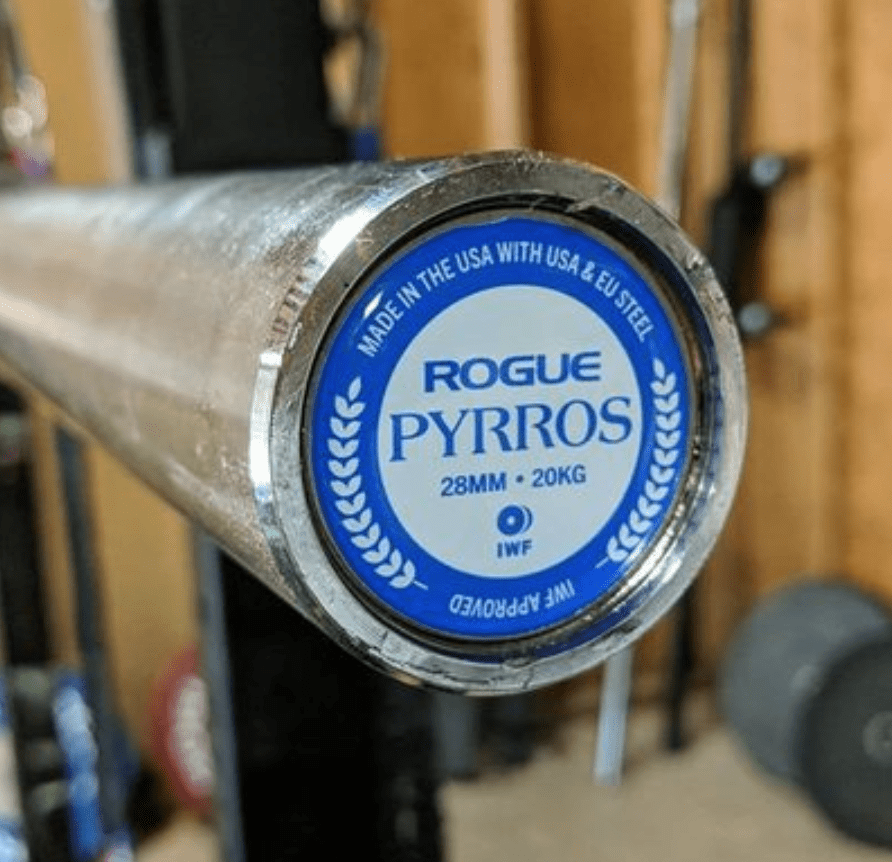
Product Highlights
- IWF-certified barbell co-developed with 3-time Olympic Gold Medalist Pyrros Dimas
- Made in the USA
- 20KG Olympic Bearing Bar (International Weightlifting Federation standards)
- Stainless steel or chrome finishes
- 28-mm diameter
- 5 needle bearings per sleeve
- Tensile Strength of 200,000 PSI
Pros & Cons
Pros
- High tensile strength
- Needle bearings
- IWF-certified
- Tight tolerances
- Made in the USA
Cons
- Expensive
- Knurling can be too aggressive for some
Bottom Line
The Pyrros Bar is the best Olympic Weightlifting Bar that Rogue offers. Its price reflects it's quality and it should be compared to the many top options available before purchased. However, Rogue has other options that are both cheaper and still receive great reviews. If you are shopping on a budget, look somewhere else. If you're a dedicated Olympic Weightlifter and want the best American made barbell, this is it.
Another legend in weightlifting aside from Eleiko is Pyrros Dimas, a Greek lifting legend who is now coaching for USA Weightlifting as their technical director. Pyrros helped design Rogue’s premium lifting bar, the self-titled Pyrros Bar. Having used this bar before, it’s a great, durable barbell and moves well, too.
However, the knurling is a bit on the aggressive side, as I’ve typically ripped my hands after a week of consistent use. Additionally, the spin is a little less controlled than the Eleiko training bar. Although the Rogue barbell is less expensive, if you’re looking for a premium barbell, the Eleiko might be worth the extra money.
| Eleiko IWF Weightlifting Training Bar | Rogue Pyrros Bar | |
| Price | $980 | $615 or $720 (20 kg), $600 (15 kg) |
| Bar weight | 20 or 15 kg | 20 or 15 kg |
| Shaft diameter | 28 mm (20 kg), 25 mm (15 kg) | 28 mm (20 kg), 25 mm (15 kg) |
| Loadable sleeve length | 415 mm (16.34”) | 16.3” |
| Knurl | 1.2 mm, waffle pattern | Olympic knurl |
| Center knurl | Passive Olympic center knurl on the 20-kg bar, none on the 15-kg bar | Olympic center knurl on the 20-kg bar, none on the 15-kg bar |
| Knurl marks | IWF markings | IWF markings |
| Coating | Proprietary chrome finish | Stainless steel shaft, chrome or stainless steel sleeves |
| Tensile strength | 215,000 PSI | 200,000 PSI |
| Bushing or bearings? | Needle bearings | Bearings |
| Warranty | 12 years | Limited lifetime |
Customer Experience
Eleiko offers 30-day returns on unused products with the original packaging, which is pretty standard for most gym equipment companies. One thing that surprises me, however, is that the warranty isn’t a lifetime, but only for 12 years. With the durability that these bars have, I think Eleiko could probably handle a lifetime warranty. Still, 12 years should be plenty of time to notice any manufacturing faults or defects.
Customer service is fairly easy to navigate on the website, with helpful FAQ sections and information about returns, cancellations, and other policies. There are many ways to contact Eleiko, the fastest being the chat function on the website. Additionally, you can phone, email, or fill out a contact form.
Ordering and Assembling the Eleiko IWF Weightlifting Training Bar
You can purchase the Eleiko IWF Weightlifting Training Bar through the website. Financing options are available, but those payment options will vary depending on your region. The options available to you will show up during checkout.
The barbell comes in a thick cardboard tube that’s stapled shut with end caps. Removing the staples is a hassle, but once an end cap is off, the bar will slide right out of the tube. “Just like with most bars, the sleeves and shaft will be a little oily when you first take the bar out,” Kate warns, “but that’s to be expected.”
A nice perk is that the bar comes with a barbell brush with plastic bristles. Use this brush and not a metal brush to best preserve your bar’s knurl and coating.
Customer Reviews
As of this writing, there aren’t many reviews on the Eleiko Training Bar—only two reviews, both giving the bar 5 stars. Both reviews praised the bar’s grippiness without being too aggressive and the performance of the barbell, one review saying it had a great feel with its whip and spin.
Typically, I’m not a fan of having so few customer reviews, but in my experience in the weightlifting world, these reviews reflect the views from the weightlifting community. Eleiko bars are highly sought after and highly praised in the weightlifting world.
Final Verdict of Our Eleiko IWF Weightlifting Training Bar Review
Hands down, Eleiko weightlifting bars are some of the best barbells out there—particularly for Olympic weightlifting, but they’re also built to last. With a high tensile strength, great spin, grippy knurling, and good bar whip, it has everything a lifter would want in a barbell.
While it may not be thick enough of a bar for powerlifters, the quality of the Eleiko IWF Weightlifting Training Bar is still present, making it a solid choice for your home gym. The biggest drawback is its price, approaching $1,000, but if you have the budget for it, this premium barbell will last for years to come.
Full Rating
Elieko IWF Training Bar
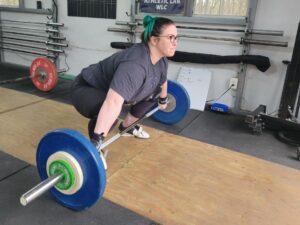
If you have the money, this Eleiko bar is fantastic for those who perform weightlifting movements, specifically, the clean-and-jerk and the snatch.
Product Brand: Eleiko
Product Currency: $
Product Price: 980.00
Product In-Stock: InStock
4.63
Eleiko IWF Weightlifting Training Bar: FAQs
What is an IWF barbell?
An IWF barbell is certified by the International Weightlifting Federation to be used for international weightlifting competitions—either for competition or training halls. To be certified, the barbell must meet certain specification requirements, including the shaft diameter, weight, sleeve diameter, and length.
Is an Eleiko Weightlifting Bar worth the money?
An Eleiko weightlifting bar is pricey, costing around $1,000 depending on the type of barbell you purchase. For some, the price may not fit in their budget, but the precision, durability, and craftsmanship of the bar make it a worthwhile purchase for those who can afford it.
How much is an Eleiko Power Bar?
Power bars from Eleiko can still be pricey. Eleiko powerlifting barbells can range from $850 for a non-certified power bar, to $1,120 for an IPF-certified powerlifting barbell.
Further reading

We break down various exercises to deliver the best sandbag workouts to target every muscle group. Read more

A registered dietitian explains the best creatine alternatives for anyone who’s still looking to pack on quality muscle. Read more

ProForm has been making a variety of popular fitness equipment for years. Find out more about one discontinued model with this ProForm Endurance 520 E Elliptical review. Read more

Wondering if running while pregnant is safe? Read on to find out how it affects you and baby. Read more

